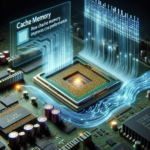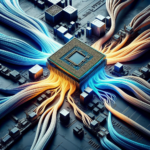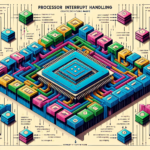Understanding the Impact of CPU on Smart City Infrastructure
Understanding the Impact of CPU on Smart City Infrastructure
As urbanization continues to accelerate, the concept of smart cities has emerged as a solution to manage the complexities of modern urban life. Smart cities leverage advanced technologies to enhance the quality of life for their residents, improve operational efficiency, and ensure sustainable development. At the heart of these technologies lies the Central Processing Unit (CPU), a critical component that drives the computational power required for various smart city applications. This article delves into the impact of CPUs on smart city infrastructure, exploring their role, benefits, challenges, and future prospects.
The Role of CPUs in Smart City Infrastructure
Data Processing and Management
Smart cities generate vast amounts of data from various sources, including sensors, cameras, and IoT devices. CPUs play a crucial role in processing and managing this data. They enable real-time data analysis, which is essential for making informed decisions and optimizing city operations. For instance, traffic management systems rely on CPUs to analyze traffic flow data and adjust signal timings to reduce congestion.
Supporting IoT Devices
The Internet of Things (IoT) is a cornerstone of smart city infrastructure. IoT devices, such as smart meters, environmental sensors, and connected vehicles, require robust computational power to function effectively. CPUs provide the necessary processing capabilities to handle the data generated by these devices, ensuring seamless communication and coordination across the smart city ecosystem.
Enhancing Public Safety
Public safety is a top priority for smart cities. Advanced surveillance systems equipped with high-performance CPUs can analyze video feeds in real-time, detect anomalies, and alert authorities to potential threats. Additionally, CPUs enable the integration of various public safety systems, such as emergency response and disaster management, to create a cohesive and efficient safety network.
Benefits of High-Performance CPUs in Smart Cities
Improved Efficiency
High-performance CPUs enhance the efficiency of smart city operations by enabling faster data processing and analysis. This leads to quicker decision-making and more effective resource allocation. For example, smart energy grids can use real-time data to optimize energy distribution, reducing waste and lowering costs.
Enhanced User Experience
Smart city applications, such as mobile apps for public transportation and smart parking systems, rely on powerful CPUs to deliver a seamless user experience. High-performance CPUs ensure that these applications run smoothly, providing residents with reliable and convenient services.
Scalability
As smart cities grow and evolve, the demand for computational power increases. High-performance CPUs offer the scalability needed to accommodate this growth. They can handle larger volumes of data and support more complex applications, ensuring that smart city infrastructure remains robust and adaptable.
Challenges and Considerations
Energy Consumption
One of the primary challenges associated with high-performance CPUs is their energy consumption. Smart cities must balance the need for computational power with energy efficiency to minimize their environmental impact. This requires the development of energy-efficient CPUs and the implementation of sustainable practices.
Data Security and Privacy
The extensive use of CPUs in smart city infrastructure raises concerns about data security and privacy. Protecting sensitive information from cyber threats is crucial to maintaining public trust and ensuring the integrity of smart city systems. This necessitates robust cybersecurity measures and ongoing vigilance.
Cost
Implementing high-performance CPUs in smart city infrastructure can be costly. Cities must consider the financial implications of upgrading their systems and ensure that the benefits outweigh the costs. This may involve strategic planning and investment in long-term solutions.
Future Prospects
Advancements in CPU Technology
The future of smart cities will be shaped by advancements in CPU technology. Innovations such as quantum computing and neuromorphic processors hold the potential to revolutionize data processing capabilities, enabling even more sophisticated smart city applications. These advancements will drive further improvements in efficiency, scalability, and functionality.
Integration with Artificial Intelligence
Artificial Intelligence (AI) is poised to play a significant role in the evolution of smart cities. CPUs will be integral to the implementation of AI-driven solutions, such as predictive analytics, autonomous vehicles, and intelligent urban planning. The synergy between CPUs and AI will unlock new possibilities for enhancing urban living.
Sustainable Development
As the focus on sustainability intensifies, the development of energy-efficient CPUs will be paramount. Future smart cities will prioritize green technologies and practices, leveraging advancements in CPU design to reduce energy consumption and minimize their environmental footprint.
FAQ
What is a CPU, and why is it important for smart cities?
A Central Processing Unit (CPU) is the primary component of a computer that performs most of the processing inside a computer. In the context of smart cities, CPUs are essential for processing and managing the vast amounts of data generated by various smart city applications, enabling real-time analysis and decision-making.
How do CPUs support IoT devices in smart cities?
CPUs provide the necessary computational power for IoT devices to function effectively. They handle the data generated by these devices, ensuring seamless communication and coordination across the smart city ecosystem. This is crucial for applications such as smart meters, environmental sensors, and connected vehicles.
What are the benefits of high-performance CPUs in smart cities?
High-performance CPUs enhance the efficiency of smart city operations, improve the user experience, and offer scalability to accommodate growth. They enable faster data processing and analysis, support seamless application performance, and handle larger volumes of data and more complex applications.
What challenges are associated with the use of high-performance CPUs in smart cities?
Challenges include energy consumption, data security and privacy, and cost. High-performance CPUs can consume significant amounts of energy, raising environmental concerns. Protecting sensitive information from cyber threats is crucial, and the financial implications of upgrading systems must be carefully considered.
What future advancements in CPU technology could impact smart cities?
Future advancements in CPU technology, such as quantum computing and neuromorphic processors, hold the potential to revolutionize data processing capabilities. Integration with Artificial Intelligence (AI) will unlock new possibilities for enhancing urban living, and the development of energy-efficient CPUs will support sustainable development.
Conclusion
The impact of CPUs on smart city infrastructure is profound and multifaceted. As the backbone of data processing and management, CPUs enable the efficient operation of various smart city applications, from traffic management to public safety. High-performance CPUs offer numerous benefits, including improved efficiency, enhanced user experience, and scalability. However, challenges such as energy consumption, data security, and cost must be addressed to fully realize the potential of smart cities. Looking ahead, advancements in CPU technology and integration with AI will drive further innovation, paving the way for more sophisticated and sustainable urban environments. By understanding and leveraging the power of CPUs, cities can create smarter, more resilient, and more livable communities for their residents.




